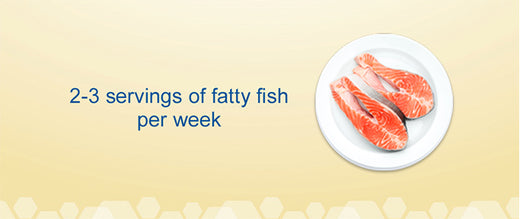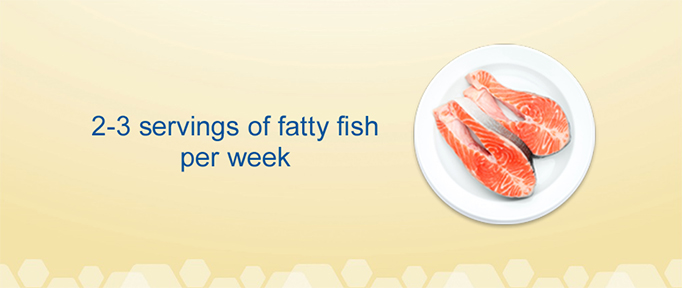
Pregnancy Nutrition: Foods to Avoid and Common Myths
Should you eat for two? All fats are bad and should be avoided during pregnancy? Drink up even if it makes you sprint to the bathroom? Which of these are myths and which are truths? It’s important to have your facts right so that you can eat healthily all through your pregnancy for yourself and your baby.
 | “Eating for two” during pregnancy means eating twice as much |
Truth: While it is true that the mom is eating for herself and her baby, she does not need to eat for two persons. Most moms-to-be carrying one baby only need about 290-360 additional calories a day from their normal diet in the second trimesteri. That is about a glass of milk with a cup of cereal and a banana. In the third trimester, the recommendation increases to around 470 extra calories or equivalent to one slice of cheddar cheese, half a peanut butter sandwich, one serving of low fat yoghurt, and an apple. Make sure you meet this calorie increase with healthy food instead of food/ beverages high in added sugars or solid fats, e.g. sugary soda, buttered pastries, fries, etc.
 | Forget fish during pregnancy because of safety concerns |
Truth: Many kinds of seafood, especially fatty fish, are great sources of docosahexaenoic acid (DHA)—an omega-3 fatty acid that plays an important role in supporting your baby’s developing brain and eye. Additionally, fish is also a good source of protein while being low in saturated fat, therefore should be included in a healthy pregnancy diet.

Worried about mercury intake? Stick with low-mercury fish choices like salmon, cod, sardine and tilapia, which you can enjoy up to 2-3 servings a week. Steer clear of fish that are high in mercury, like swordfish, King mackerel, and sharkii. Make sure your diet and perhaps your prenatal supplement include DHA.iii Experts recommend at least 200 milligrams of DHA per day for pregnant or lactating women.
 | Limit water intake to avoid frequent bathroom trips and retaining water |
Truth: While it might be annoying to make those frequent bathroom trips (a common pregnancy symptom due to the increased pressure of your baby pressing on your bladder) there is no excuse to cut back on the amount of water you are drinking. In fact, pregnant women should be sipping more frequently because your general fluid needs increase during pregnancy to support fetal circulation, amniotic fluid, and a higher blood volumeiv . You would need at least 300ml of additional fluid intake a day during pregnancyv.
 | Always give in to pregnancy cravings–they’re your body’s way of letting you know what it needs |
Truth: There is no evidence to suggest that cravings are a sign of what your body needs, as was previously believed: research shows that there is no proven link between the foods you crave and the nutrients you may need. While all the reasons behind food cravings during pregnancy are not well understood, they could largely be originating from hormonal and emotional changes, or even a change in taste buds . Spoil yourself in moderation. Just be sure that your cravings are not edging out the healthier choices rich in nutrients that you and your baby need. Have healthy snacks on hand, like nuts and fruits so you won’t be tempted by less nutritious food around. And if your cravings are for things other than food (such as ice, clay, or sand)—a condition known as pica—discuss it with your doctor.
 | All fats are bad for you and should be avoided during pregnancy |
Truth: It is not true that all fats are bad for you. Polyunsaturated fats from foods like avocados, nuts, low-mercury seafood, and oils like olive or flaxseed are good-for-you fats. For example, omega-3 fats like DHA is important for both your health and your baby’s development. Meanwhile, you should limit your intake of trans fats and saturated fats—the kinds that generally come from foods like fries, buttery pastries, and meat fat.
References:
- World Health Organization, Food and Agriculture Organization of the United Nations, United Nations University (2001). Human energy requirements: Report of a Joint FAO/WHO/UNU Expert Consultation, Rome, Italy.
- Eating Fish: What Pregnant Women and Parents Should Know. Retrieved 2 June 2017 from, https://www.fda.gov/food/foodborneillnesscontaminants/metals/ucm393070…
- Food and Agriculture Organization of the United Nations (2010) Fats and fatty acids in human nutrition Report of an expert consultation, FAO Food and Nutrition Paper 91, FAO, Rome, 2010.
- Curtis, G. B., & Schuler, J. (2016). Your Pregnancy Week by Week (8th ed.). Philadelphia, PA: Da Capo Press. Page no. 217
- EFSA Panel on Dietetic Products, Nutrition and Allergies (NDA) (2010). Scientific Opinion on Dietary Reference Values for water. EFSA Journal; 8(3):1459.



